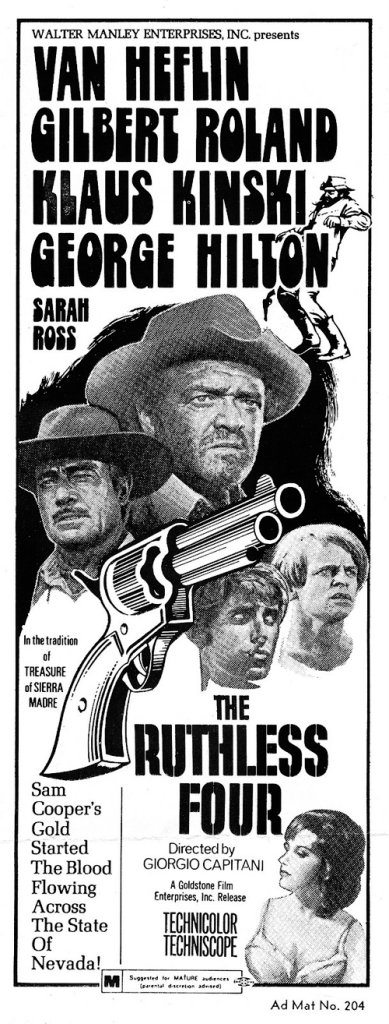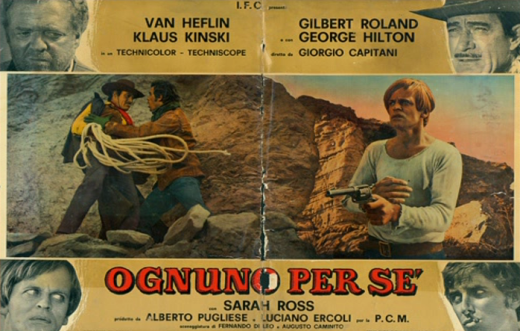Dir: Giorgio Capitani
Star: Van Heflin, George Hilton, Klaus Kinski, Gilbert Roland
a.k.a. The Ruthless Four
Th is certainly lives up to its title, beginning with a literal bang, as Sam Cooper (Heflin) blows up a goldmine and his partner, after the latter tries to double-cross Cooper out of his share. He struggles back across the desert to town, where his return without said partner lead to suspicious gossip. Needing a new partner to get the gold out, he calls up Manolo (Hilton), who was almost Cooper’s foster son. However, Manolo then brings his friend, Brent the Blond (Kinski) in as another participant, much to the chagrin of the original owner.
is certainly lives up to its title, beginning with a literal bang, as Sam Cooper (Heflin) blows up a goldmine and his partner, after the latter tries to double-cross Cooper out of his share. He struggles back across the desert to town, where his return without said partner lead to suspicious gossip. Needing a new partner to get the gold out, he calls up Manolo (Hilton), who was almost Cooper’s foster son. However, Manolo then brings his friend, Brent the Blond (Kinski) in as another participant, much to the chagrin of the original owner.
Worried he is outnumbered and likely to meet an unpleasant fate in the mountains, Cooper tries to even the odds by turning to Mason (Roland), who deserted the army alongside Cooper, but now holds a grudge against him, believing he turned Mason in to the authorities. The four new stake-holders head out on the long journey back to the mine’s location, known only to Cooper, and it’s not long before they are attacked by a group apparently keen on jumping their claim. Once they arrive, it soon becomes clear that everyone seems to have their own plans, with alliances forming and melting as each of the participants maneuver for superiority and the upper-hand.
This is a solid one, with a script that keeps the viewer entertained as it twists and turns. There’s a creepy vibe, fairly daring for the time, hinting at an unhealthy, possibly homosexual, relationship between Manolo and Brent [there’s also a rather odd scene in a bath-house which also seems rather out of place], though Hilton is probably the weakest of the four actors. There’s one scene in particular – you’ll know it when you see it – where he isn’t so much chewing the scenery as gnawing on it like a rabid beaver.
On the other hand, Kinski is very restrained: he’ll go into a bar and ask for a glass of milk, and for no particular reason, he’s dressed in priest’s garb. But any doubt whether this is a fraud is dispelled by the scene where someone greets him as a cleric. It’s entirely clear who is the dominant partner (emotionally, if not necessarily sexually), particularly in one scene where Manolo is gabbling away, trying to convince his partner that they don’t need to kill the “old and harmless” Cooper, and if they take care of Mason, then Cooper will be “no problem.” Brent does little more than stare back, as Manolo pleads his nervous case, before dismissing the argument: “You think too much. Just take orders from me. If I want you to kill Cooper, you’ll kill him, won’t you – because you’ve always taken your orders from me. Isn’t that right?” There’s also a cool shot in the mine, where a cloaked Brent looks like a pick-ax wielding incarnation of the Grim Reaper.
Heflin, a supporting actor in classic Westerns such as 3:10 to Yuma, was once famously told by Louis B. Mayer, “You will never get the girl at the end.” His character here certainly looks like he has a story to tell, just based off a face which looks like a granite outcrop. Heflin was already in his late fifties, and would only make a couple more movies, before his death from a heart-attack in 1970 – it’s nice to see a hero who isn’t an obvious leading man type. But it”s the constantly-shifting dynamics between the quartet that are most engrossing, with a real sense of underlying violence, never far away. The gun-battle at the burned-out mission on the way to the mine is particularly well-handled, and I also appreciated Capitani’s creative use of silence – most notably, the early sequence where Cooper struggles back from the mine, with little or no water and increasingly exhausted.
Despite undeniable similarities to John Huston’s classic Treasure of the Sierra Madre, the overall result is a solid piece of work, that works within the standards of the genre, yet still manages to generate no shortage of new wrinkles. Most of which appear to have found a permanent resting place on Heflin’s face. The Italian title translates as Everybody for himself, and seems perfectly appropriate – but even more so would have been the title originally planned, Ognuno per sé (e Dio per nessuno). That one translates as: Everybody for himself (and God for nobody).
